Music | August 21st, 2019
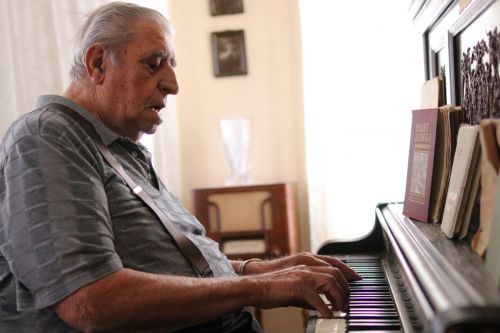
NAPOLEON – Without his trusted Beltuna accordion, Victor Wald turned to the antique piano. He pushed a few keys. Listened. It was still in tune.
The old German Russian folk songs flowed effortlessly from his large hands. His wife, Barb, picked up the words half way through “In München steht ein Hofbräuhaus,” or the “Hofbräuhaus song.”
“Water is cheap, pure and good, but it thins our blood, far better is a drop of golden wine, but the best is this: in Munich is the Hofbräuhaus, one, two, drink up,” Barb sang in German.
“I never got tired the minute I strap on the accordion,” Wald said. His father bought him his first accordion when he was 14 for $350. He liked a good polka then, but music didn’t pull his heartstrings until decades later, and since then he has performed for countless weddings, polka parties, and even before the North Dakota State Legislature. “I’ve enjoyed every minute I had.”
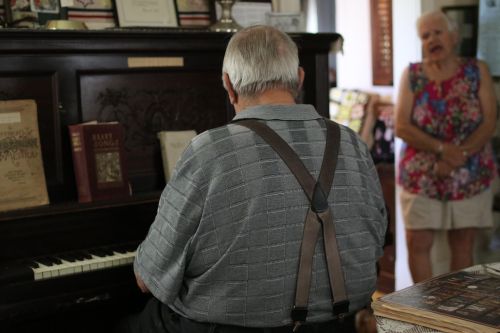
From inside his pickup truck, Wald turns up the radio volume on AM 1130. Former Glen Ullin German singer Tony Schaaf’s voice accompanies a polka tune. The beat is lively, North Dakotan, different from other German Russian areas throughout the United States and Canada.
In the old days every town in German Russian country North Dakota had a polka night, usually on a Monday because the church didn’t like people showing up to mass with hangovers. Nearly every family had an accordion, and everyone loved to dance, Wald said. From Napoleon to Strasburg – Lawrence Welk country – people celebrated Name Days, not birthdays, with songs and good homemade Hochzeit schnapps, locally called Redeye.
“We had more dancers, and a lot more dances years ago,” Wald said. “I tell the kids that we had more fun than they have,” Wald said. “Everybody here knew how to dance.”
North Dakota’s rural exodus has left Logan County with less than half the people it once had, which has hurt the accordion culture. Rock and Roll music and the sexual revolution didn’t help as many turned their backs on centuries-old traditions brought over from Russia to more modern tunes.
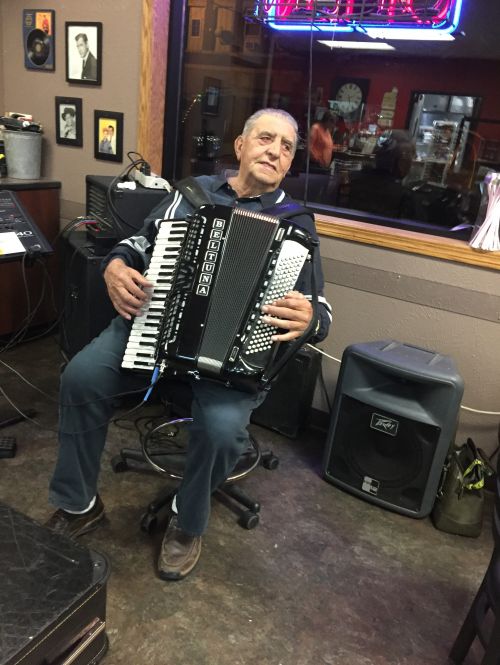
But there is magic in centuries-old folk songs handed down from grandfather to grandson, mother to newborn babe. Some songs stir the feet to dance. Some bring grandma back to life, unironed, calloused hand and familiar melody soothing childhood nightmares away. Rural North Dakota has already lost many of its people, its grocery stores and businesses. The barn dances and weekly polka nights are struggling to survive, but some in German Russian country are fighting to keep the old ways alive.
At 85 years old, Wald’s trusty Beltuna accordion has gained too much weight, not as easy to lift as it once was. He mostly plays at nursing homes and smaller venues now, and he’s entrusted the polka parties to the younger ones in German Russian country.
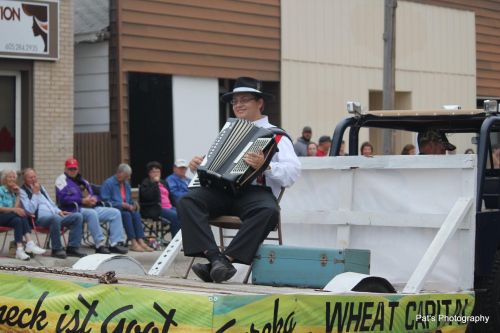
North Dakota’s accordion style
When Hunter Heinrich was old enough to sit still for television his favorite program was the Lawrence Welk Show. Welk was a North Dakota native from Strasburg, an accomplished musician, accordionist, and television impresario behind the show that ran from 1951 until 1982.
“I think that’s how it got started,” Heinrich, now 18 and recently graduated from high school, said. “My parents had no interest in polka music, none whatsoever, but I started going to the dances when I was about 10 years old and from there I just loved it.”
Like Victor Wald, Heinrich learned to play the accordion by ear. Books filled with notes do not help. He listens, practices, and then plays in polka festivals from Braddock, to Crosby’s Threshing Bee, to Ashley, to Oktoberfests in North and South Dakotas.
“It took me a couple days to learn the first song,” Heinrich said. “The base side is the side with all the buttons, and the keyboard side, that’s where you make your melody. The base side keeps the beat going. It took me a week to learn the first song and after that I can figure out almost any other song.”
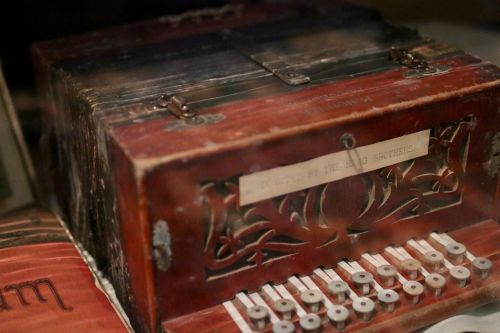
He knows of three people his age who play accordion, he said. Three is better than none. Heinrich has already performed at 10 different venues this summer, and plans on playing four more before winter sets in.
“People are getting more interested in family heritage,” Heinrich said. “I feel it’s very important to learn about your family’s history and heritage, we wouldn’t be here today if it weren’t for them slaving away for our generation.”
He once wore the German lederhosen outfit to a performance in Eureka, but only once.
“That’s not what these people wore around here,” Heinrich said. “If you look at old pictures, they were wearing button up shirts and a suit jacket yet. And then they always wore them hats, something like newsboy hats.”
North Dakota accordion music differs from other German Russian communities or even Polish polkas, Heinrich said. Minnesotans play slower, Polish polkas are too fast, but North Dakotans play just right, he said.
“My favorite songs are accordion, a guitar, and a drum,” Heinrich said. “Get a clarinet or a trumpet in there and they sound good, but we have our own distinct style.”
Michigan and Wisconsin have a more Polish style with a faster tempo, Heinrich said.
“Something that brings the kids in,” he said. “A lot of kids are dancing to it over there. It’s thriving, but over here it’s dying and I don’t know what to do. There’s only so much one person can do.
“I’m trying to save it. I’m not a fan of polka from say – there’s Minnesota style – I like North Dakota and South Dakota style. We have our own distinct style.”
Heinrich is also preserving music from local bands. He scours estate sales, auction sales, and neighbors’ attics for old cassette tapes that he burns onto CDs for preservation.
Heinrich will be playing at the Napoleon Polka Fest the last weekend in September at the Napoleon Legion Hall.
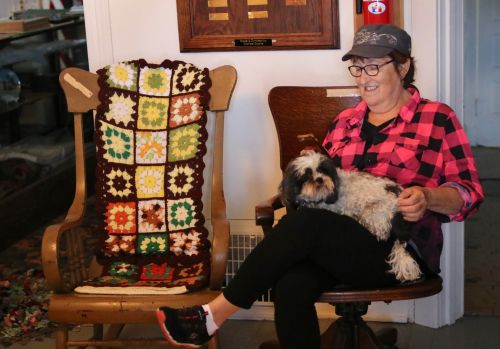
‘They were in the clouds’
Dancing to the polka isn’t for the faint of heart. Some in German Russian country say dancing three polkas separates the weak from the strong.
When Carmen and John Wald got married, the accordion was their entertainment centerpiece.
“When Carmen and I got married we didn’t miss one dance that night,” John said. “There were some who could dance like they were in the clouds.”
“It’s a major workout if you’re out dancing the polka,” Carmen said. She’s the manager of the German-Russian Country: Prairie Legacy, or the Tri-County Tourism Alliance.
She still speaks German, and says the accordion culture in North Dakota never truly left.
“I see a lot of people pushing back, we’re having a resurgence of cultural heritage,” Carmen said. “Polka music is a large part of that.”
She pointed to Lawrence Welk as an example of what today’s farming communities can accomplish: diversify, create, and market new ideas to bring fresh life back into rural North Dakota.
“Welk was an amazing musician, but even more he was an amazing entrepreneur,” Carmen said. “Just to be able to market the work he was doing. They even laughed at him because of his accent, but people told him don’t ever change because people want to watch you and listen to your accent.
“He’s a native son and he’s revered in that regard.”
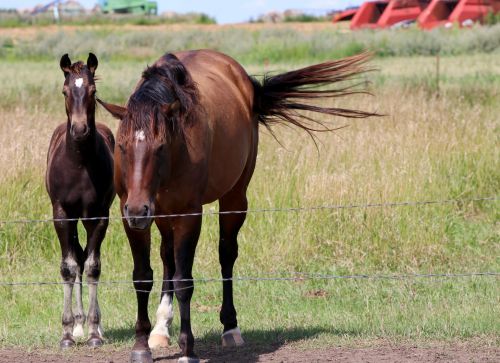
Polka parties wouldn’t be complete without homemade schnapps and other tasty beverages, not to mention the food: German potato salad, farm-made sausages, sauerkraut, schnitzel, or knoephla. Falling on hard economic times primarily due to the recent trade war with China, some farmers are turning to other avenues like making sausages to subsidize lost income, but they’re frequently stumped going to market by laws that take potential profit away, Carmen said.
“The farm economy is awful right now and there are farmers that are diversifying to make a little money,” Carmen said. “What we have to remember is that these local people are the ones supporting your kids in sports and supporting historical societies.”
Bringing back accordion culture is one way to keep rural communities alive.
“A lot of the German Russian songs carry the history of the German people,” Carmen said. “It’s more than just songs. They tell the history when they went through something horrible, or went through something wonderful.”
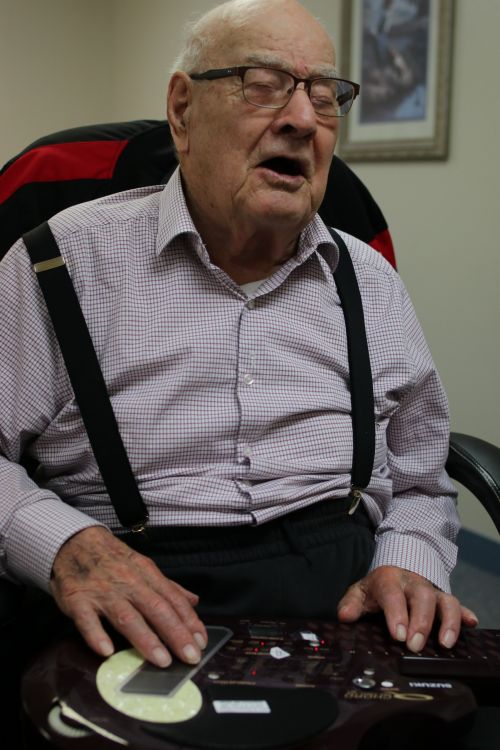
‘And then the people would sing’
John Gross was the third child among a total of 16 siblings. His great grandparents emigrated from Russia and settled in Napoleon. At 94 years old, he fought in World War II and was recently named as a “cultural treasure” for his work teaching folk music by Governor Doug Burgum. He grew up speaking German, with some Russian intermixed, and told the story of how North Dakota’s German Russians arrived.
Germans from Russia were primarily farmers who were invited to Russia to tame wild lands. They were promised exemption from military service, but the Czar later reneged. After a series of famines, Germans began leaving Russia and followed the promise of free land in the Upper Midwest.
From Eureka, South Dakota, German Russians migrated north as far as the train tracks could take them, and settled in central North Dakota. They gathered in tightly knit ethnic German communities: Catholics in Emmons and Logan counties, Lutherans in McIntosh and eastern Logan counties, and turned the prairies into profitable farms and ranches.
They first arrived in sheepskin coats, high Russian boots, and flowery head shawls, and although the wardrobe has changed, German-Russian dialects and strong musical traditions still exist. Songs such as “Wir sitzen so Froehlich beisammen” or “We’re Sitting Together So Happily,” contain special meaning for North Dakota’s German Russians as it recalls their ancestors’ emigration to Russia following the devastating Napoleonic invasions of Europe, according to NDSU’s Germans from Russian Heritage Collection.
Gross spoke German first, but curse words were the Russian language’s domain, he said jokingly. He learned the old folk songs from his father, a farmer and the church organist. Singing in the German tongue appears to Gross a comfort, a way to express happiness and sorrow.
During World War II Germans from Russia were considered traitors, he said.
“It didn’t take long for someone to call me a Nazi,” Gross said. “My dad thought the Germans could do no wrong, but I didn’t think like that.”
Secret agents scoured the area and he heard stories of at least two people who were arrested for sympathy to the Nazi cause.
Gross went on to fight in the Philippine Islands, returned to Napoleon and became a master teacher to more than 10 apprentices interested in learning the old folk songs. The apprenticeships were granted through the North Dakota Council on the Arts.
Some of Gross’s songs have never been written down on paper, but have continued for hundreds of years through word of mouth.
“The accordion was more popular with Germans in Russia,” Gross said. “When there is a wedding and there is an accordion playing you can be pretty sure that guy has a German background.”
As a child his family didn’t have radios or televisions, so a few sips of homemade schnapps around the kitchen table almost always led to songs.
“They would have a few drinks, then one guy would say…” He rattled off a phrase in German. “Someone would call for a song.”
Birthday celebrations weren’t important growing up in German Russian country, he said.
“Every dog has a birthday, but not a Name Day,” Gross said. “Name Days were important, usually a lot of people would come. In our community when you were baptized you were given a Catholic name. My mom would make something, and my dad would make some whiskey and people would have a few schnapps – like this.”
He imitated a short sip with his hand.
“And then the people would sing.”
Gross never learned the accordion; he plays a Q-chord. Ninety years ago his family was too poor to buy him the instrument, he said. His voice is gravelly with age, but soothing as he sings one folk song after another. Some of the tunes are vaguely familiar. His eyes pool with tears as he sings his favorite song, “Ich Bin Ein Farmer Buh,”or “I am a Farmer Boy.”
When finished, he cleared his throat, and began a song about losing a sock.
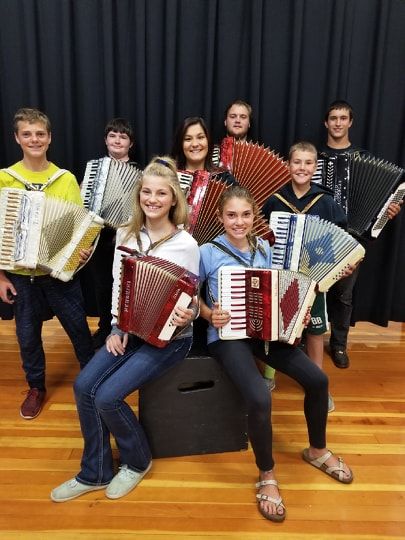
YOU SHOULD KNOW:
28th Annual Polka Party
September 28-29, 1-8 p.m.
American Legion Hall, Napoleon, ND
March 2nd 2026
January 12th 2026
September 16th 2025
August 19th 2025
June 9th 2025


_(1)_(1)_(1)_(1)_(1)__293px-wide.jpg)


